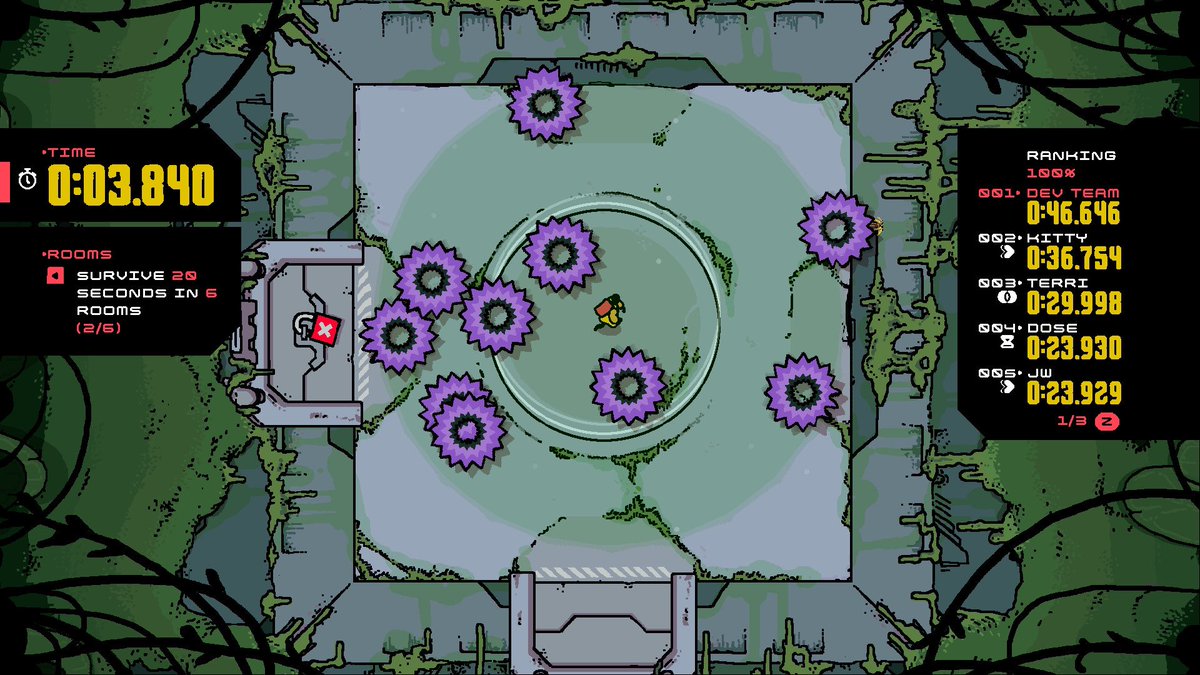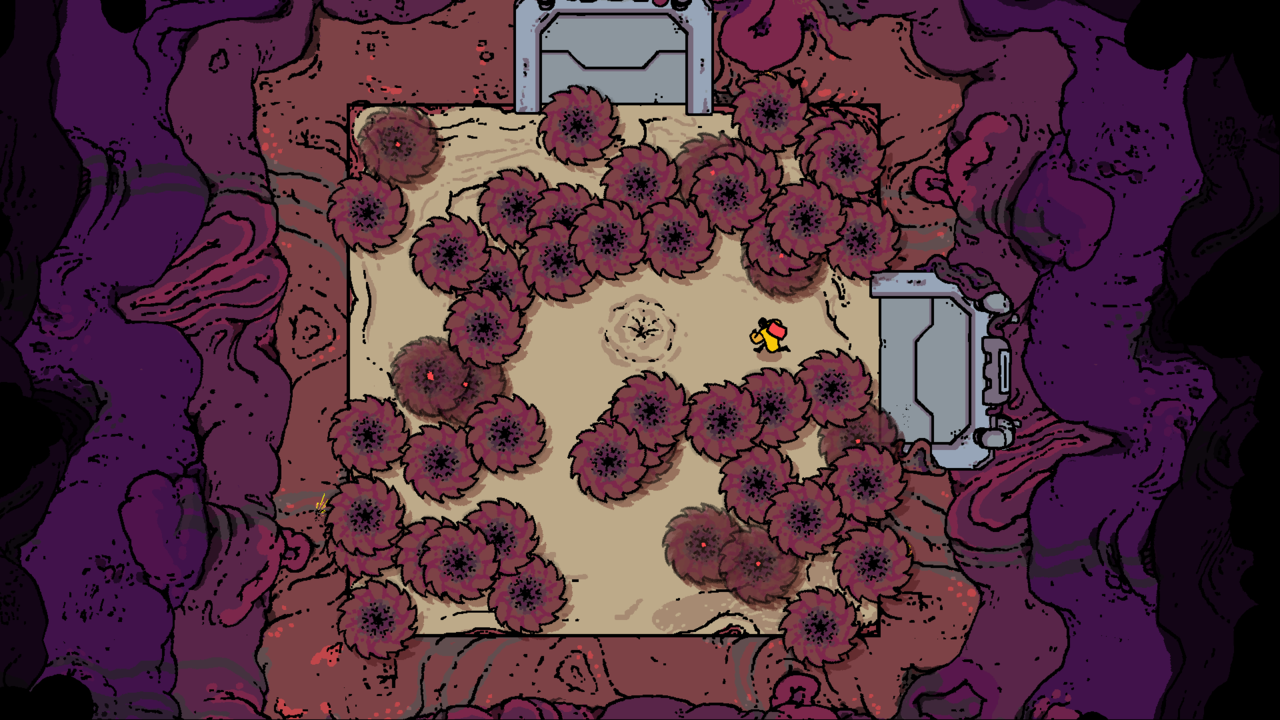Platforms:
PC,
Released:
October 23, 2020
Publisher:
Devolver Digital
Developer:
Terri, Dose, Kitty, JW
One of many great things about the indie game space is that it caters to all kinds of interests. Consider the bullet hell genre. Whilst there are some AAA that dabble in its waters, for the more pure, and more interesting takes, you have to go indie. Maybe these games will never get blockbuster appeal, but they can take pride in a simple premise executed well. So while Disc Room is unlikely to take home massive game of the year awards, it knows what it wants to do and does a damn fine job of sticking the landing.
Disc Room in a good space
The backdrop of Disc Room is a well-worn road of sci-fi. Scientists find some weird alien stuff and investigate, thus beginning a cycle that leads to a whole bunch of astronauts getting killed. Today’s astrological anomaly is a giant disc orbiting Jupiter. After venturing inside you find it full of rooms filled with discs, or rather sawblades. You duck, you weave, you uncover little story nuggets along the way. It’s pretty simple stuff but it’s a backdrop for a reason.
The other side of the backdrop is of course the visuals, and similar to the story, it’s more about function than form. Your character is a small dude surrounded by big circular things that hate you, and that covers a lot of the conversation. The rest of the visuals are about signaling the various types of hateful round things to contend with and the different environments. In the grand scheme of things though, keeping things concise and to the point feels like a virtue. When your eyes are getting sore staring intently at everything happening, it all can fade into the background a bit. The most important part of the visuals is about making it obvious where everything is. You don’t want vague visuals, you want something quick, immediate, and fair. Disc Room ticks all those boxes.

The gameplay is a vicious cycle (in a good way)
Put bluntly, Disc Room isn’t about the story, it’s about the very gory journey. The entire disc that you’re exploring splits into individual square rooms. In each is a sawblade, with all manner of sizes, colours, shapes, attack plan, and possible levels of sentience. What does not change is touching them is very bad for your health, instadeath bad.
So on the small scale, Disc Room exists as a kind of bullet hell-like experience. Over time you gain a variety of super moves to keep you alive. Dodge through saw blades, slow time, or clone yourself to essentially get multiple lives. These are merely a few of your self-preservation choices. The rub is you can only pick one of those power-ups at the start of each survival attempt. So it pays to get comfortable with a few to give you some options to try when you’re sick of dying. This all fits into the room-by-room leaderboards, that give you some competition to try and overcome. Weirdly enough though, the game feels a bit different at a macro level.
“On the small scale, Disc Room exists as a kind of bullet hell-like experience… On a larger scale, Disc Room feels more like a dungeon crawler.”
On a larger scale, Disc Room feels more like a dungeon crawler. See each room lies adjacent to two or more other rooms. To unlock a door, you must complete a specific task. This can be surviving a certain number of seconds, or getting killed by a certain number of different discs. As such the overall goal here is simply to push through all the rooms, defeating bosses along the way. It’s an interesting little dynamic between the big and the small of this game. In essence, this means that deaths carry no real negative weight. Instead, they may help pave the path forward. It’s a smart choice because it means that a room that is too hard is not the end of the world. There are enough rooms to explore to give you options. The asterisk is that, as the boss fights suggest, there are bottlenecks here. In the grand scheme of things, it isn’t a big issue. It’s the tradeoff for a sense of structure. Bonus points for giving a really well thought out post-game hard mode too.
The good news for us humans, and games critics, is the range of difficulty modulation. The game Celeste springs to mind and its game time percentage control. Disc Room has pushed the concept further. Players can also alter the speed of discs and miscellaneous hazards. The goals also can be modulated. For example, you can adjust a 10-second survival requirement down to a 7 or lower the bar for certain score challenges. I like this kind of stuff.
I’m a rather persistent person, especially when the game feels fair and achievable. Oh and that is definitely the feeling I got playing this game. But when I’ve hit my head against the brick wall enough times (I racked up over 150 deaths in one particular room), I like having the option to just nudge the difficulty a little. I am always a fan of letting the player adjust to taste. On that point, I should also mention that the needle swings both ways. For example, the global play speed can be doubled up, for a bonus challenge. There are even separate leaderboards for the different global game speeds, so you can see where you stack up with everyone.

Keeping the constant threat of death engaging
I think the real question that pertains to Disc Room’s quality is how much variety is on display. As nice as the core loop is, what differentiates one death trap from another? I’ll say, generally speaking, Disc Room does a good job of keeping things fresh.
On the most surface level, Disc Room gives a little variety with its different “worlds”. In essence, the disc is split 5 ways, with 5 different themes, which switches up the formula. With each area is a couple of new discs to add to the collection, your Pokédisc if you will. Perhaps the biggest shake-up is each area mixes up the scoring. There is one exception, but without spoiling, it brings a whole new flavour of challenge, which certainly makes things interesting.
The highlight though, in my opinion, is the boss fights. Sure these can be a bit grueling, but it’s where you can see a bit more personality shine through. Rooms, whilst presented as unique, simply tailor the discs being flung out. The bosses properly give more reliable patterns, with multiple stages. There’s a much more palpable sense of achievement here, and something that I wished the game chased even more.
With all the variety going on, the game can get a bit obtuse. The nature of the game makes it hard to keep tabs on how your score changes in response to your actions. It’s easy to read the scoreboard and such, but it’s a far distant second priority to ducking and weaving around obstacles. I will also say that, although it’s very petty, it irks me that the game scores entirely through time. In most cases, it makes perfect sense. Although some win conditions are explicitly not time-based. I understand that the developers want to disguise the win conditions, but it can make a confusing room a little bit more annoying.
Some of the rooms, even after having cleared most of the game, still make no sense to me. I don’t know if I’m just not getting them or if they are deliberately confusingly presented. Regardless, it’s a small bump for me in an otherwise excellent game.
8
Great
Positive:
- Solid core gameplay loop
- Good variety between levels
- Boss fights are a highlight
- Difficulty options are abundant and smart
Negative:
- Due to the genre, it invariably becomes a bit repetitive
- Some rooms are confusing
Disc Room is a great example of a little indie game doing a damn fine job. From a small idea of bullet hell meets dungeon crawler, the developers have polished the concept up quite nicely. The variety of design ensure that each room feels unique. The innate difficulty of the game provides a satisfying challenge although it can also lead to some frustration. But thankfully the difficulty settings here are highly customisable and allow for great accessibility. Sure there are some confusing rooms, but they’re balanced out by amazing boss fights that left me wanting more. Overall, whilst there are some missteps, it’s definitely one game that’s well worth a try.





